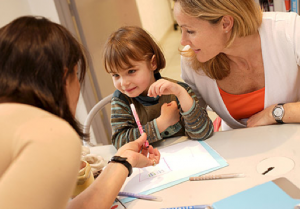 A Child Protection Social Worker is responsible for a number of different types of services designed to help families and children through various hardships and difficulties. Most often employed by state governments, a social worker specializing in children's protection must be prepared to face a number of circumstances and situations.
A Child Protection Social Worker is responsible for a number of different types of services designed to help families and children through various hardships and difficulties. Most often employed by state governments, a social worker specializing in children's protection must be prepared to face a number of circumstances and situations.
Featured BSW Programs
Skills and Education Requirements
This field requires a specific and diverse skill set in order to best protect and help children. To start, future and current professionals in this field must be able to handle stress well, empathize, communicate well both verbally and through writing, and have the ability to multi-task. Another important quality to have in order to most effectively work within this field is to be able to balance working with difficult situations and not carry that over into life outside of work.
Social workers in child welfare and protection positions must be able to manage, supervise, organize, and compile information as well as work well within teams and one-on-one with individuals. To prepare for the types of situations that a social worker will face in this area, the minimum education requirement is typically a bachelor's degree in social work, sociology, criminal justice, or psychology.
More detailed information on the skills and knowledge required for preparing for child protective services work can be reviewed in the National Association of Social Workers Standards for Social Work Practice in Child Welfare.
Investigations and Case Work
On a daily bases, Child Protection Social Workers are responsible for investigating any allegations of child abuse, endangerment, neglect, or other circumstances in which a child or children may not be safe in a current living situation. Referrals are often issued by family, friends, schools, physicians, and other interested parties who have witnessed or suspect an issue with a child's safety.
This requires for social workers in children's protection to investigate and gather evidence to either substantiate or dismiss the allegations. Workers often talk to the referring party, parents or guardians, and the children involved in the case to begin to make a determination the next course of action. From interviews to collecting physical evidence, the job requires daily interaction, investigation, and report writing to document all findings.
Working with Families
In cases where abuse, neglect, or endangerment is substantiated, a protective services worker will petition a judge in order to issue the order of removal. Many times, this requires a social worker in this specialization to testify and submit reports for various court proceedings.
In other cases, a decision to remove may not be made directly after a referral. Often, though, enough evidence of some lack of parenting or other circumstance could alert a case worker in protective services to possible need for additional resources. This might include parenting classes, anger management class, family counseling, financial assistance, or other types of intervention. A children's protective services worker will work with families in these instances in order to find the community and state resources needed.
Working in positions in order to protect children offers case workers many personal rewards, but the positions can also be demanding, emotionally charged, and stressful. With the combination of the right skills, education, and experience, a Child Protection Social Worker can improve the lives of children throughout a community.
